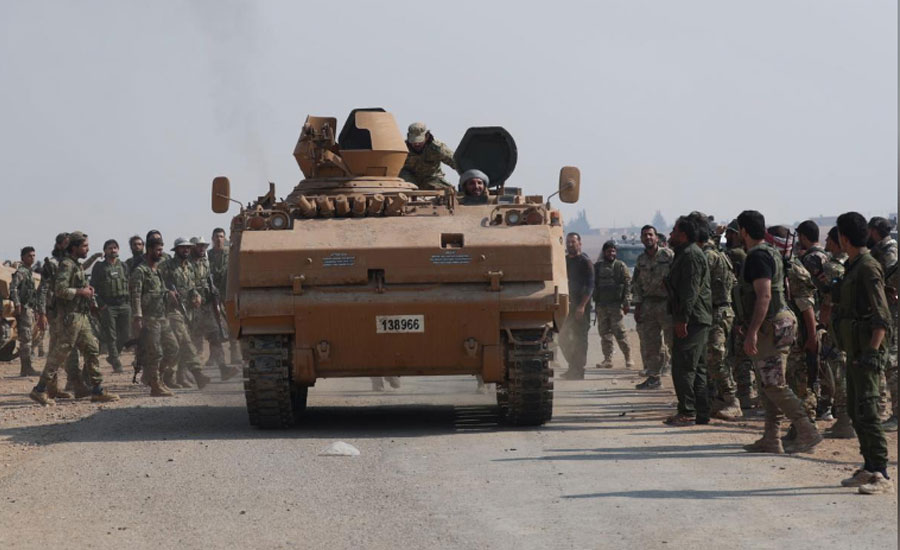Syrian Kurds accuse Turkey of violations, Russia says peace plan on track

BEIRUT/MOSCOW (Reuters) - The Kurdish-led Syrian Democratic Forces (SDF) accused Turkey on Thursday of launching a large land offensive targeting three villages in northeast Syria despite a truce, but Russia said a peace plan hammered out this week was going ahead smoothly.
Under the plan, agreed by Presidents Tayyip Erdogan and Vladimir Putin, Syrian Kurdish forces are to withdraw more than 30 km (19 miles) from the Turkish border, a goal Russia’s RIA news agency, quoting an SDF official, said was already achieved.
Russia said it was sending more military police and heavy equipment to help implement the deal, which has already prompted US President Donald Trump to lift sanctions against Turkey and drawn lavish praise for Erdogan in the Turkish media.
Ankara views the Kurdish YPG militia, the main component in the SDF, as terrorists linked to Kurdish insurgents in southeast Turkey. It launched a cross-border offensive against them on Oct. 9 after Trump ordered US forces out of northeast Syria.
The deal agreed with Putin, which builds on and widens a previous US-brokered ceasefire, helped end the fighting. But the SDF said in its statement on Thursday that Turkish forces had attacked three villages “outside the area of the ceasefire process,” forcing thousands of civilians to flee.
“Despite our forces’ commitment to the ceasefire decision and the withdrawal of our forces from the entire ceasefire area, the Turkish state and the terrorist factions allied to it are still violating the ceasefire process,” it said.
“Our forces are still clashing,” it said, urging the United States to intervene to halt the renewed fighting. Turkey’s Defence Ministry did not comment directly on the SDF report but said five of its military personnel had been wounded in an attack by the YPG militia around the border town of Ras al Ain, near where the three villages are located.
Turkey previously said it reserved the right to self-defence against any militants who remain in the area despite the truce, a pledge repeated by Erdogan on Thursday.
A US defence official said on Thursday that Washington was committed to reinforcing its military position in Syria “with additional military assets” - one of the clearest signs yet that it had not just ended plans for a full withdrawal from Syria but may add capabilities to strengthen American forces remaining in the country.
The UN special envoy for Syria, Geir Pedersen, told Reuters the ceasefire seemed to be holding “by and large” as major powers gather in Geneva ahead of the first meeting of Syria’s Constitutional Committee next week.
Erdogan also said Turkey had agreed with Russia to maintain an “observation post” on the northwestern part of Syria’s Manbij.
Russia, a close ally of President Bashar al-Assad that has emerged as the key geopolitical player in Syria, has begun deploying military police near the Turkish border as part of the deal agreed on Tuesday in the Russian city of Sochi.
“Everything is being implemented,” Interfax news agency quoted Russian Deputy Foreign Minister Sergei Vershinin as saying. RIA, citing an SDF official, said the Kurdish fighters had already withdrawn to 32 km (20 miles) away from the border. It also said the Kurds were ready to discuss joining the Syrian army once the crisis in Syria had been settled politically.
Russia will send a further 276 military police officers and 33 units of military hardware to Syria in a week, RIA news agency cited a Defence Ministry source as saying. It also quoted Russia’s Defence Ministry as saying Russian military police had patrolled along a new 60-km (37-mile) route on the border.
Next Tuesday, under the terms of the Sochi deal, Russian and Turkish forces will start to patrol a 10-km (6-mile) strip of land in northeast Syria where US troops had been deployed for years along with their former Kurdish allies.
The arrival of the Russian police marks a shift in the regional balance of power just two weeks after Trump began pulling out US forces, a move criticised in Washington and elsewhere as a betrayal of the Americans’ former Kurdish allies.
Turkey’s military operation was also widely condemned by its NATO allies, which said it was causing a fresh humanitarian crisis in Syria’s eight-year conflict and could let Islamic State prisoners held by the YPG escape and regroup.
At a monthly UN Security Council meeting on Syria on Thursday, Syria’s UN ambassador, Bashar Ja’afari, slammed Turkey’s military action and “vehemently rejects attempts by the Turkish regime to justify its actions under the pretext of self-defence or countering terrorism.”
The Russian deployments have also highlighted growing ties between Russia and NATO member Turkey. US Defence Secretary Mark Esper, speaking in Brussels on Thursday ahead of a NATO meeting, said Turkey - which annoyed Washington this year by buying Russian-made S400 missile defence systems - was moving in the wrong direction.
“We see them spinning closer to Russia’s orbit than in the Western orbit and I think that is unfortunate,” Esper said.







